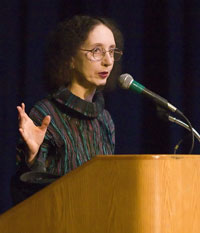Writer sows her literary Oates

Joseph Vasquez
/ The Collegian
The origins of artists’
ideas and how all people’s personalities come from their histories
were some topics addressed by renowned and versatile writer Joyce
Carol Oates Tuesday in the Satellite Student Union. She compared
people to rivers, made up of tributaries that give them their thoughts. |
By Laban Pelz
The Collegian
While each person is a completely
unique individual, everyone ultimately is a collection of things that
came before, writer Joyce Carol Oates said Tuesday night in the Satellite
Student Union.
“Our voices are a confluence,” said Oates, who is renowned
in various genres including short stories, poetry, plays, criticisms and
essays. She said a person’s parents, ancestry, experiences and even
geographical background are what make that person who he or she is.
“All these tributaries come together to form a person,” Oates
said.
Why people create art and what they decide to make were other topics she
addressed.
Oates said art is the highest expression of the human spirit.
“It is a yearning as strong as the yearning to reproduce,”
she said, and loosely quoted Ernest Hemingway, saying “‘we
write to make a whole new thing, and if we do it well enough we give it
immortality.’
“Notice we give ‘it’ immortality, and not ourselves,”
Oates said, noting how the modern quest for literary fame differs from
that of classical times.
Oates also spoke of how writers’ personalities and lifestyles contribute
to their work.
“As a typical writer, I spend much time in solitary confinement,”
she said to a audience of a few hundred. “So I may just get excited
and say things. To be a writer, or any artist, you must be interested
in your self.”
Oates said artists can sometimes lose interest in what they’re working
on, or forget why they cared enough to begin, and must keep some sort
of grounding in their product.
“You must have unconscious reasons for doing things,” she
said.
Before reading to the crowd a story she wrote some time ago, Oates spoke
of how time can make an artist disconnected from his or her work.
“You can look at your work, from when you were younger, much more
dispassionately,” she said.
Oates read several of her short works to the audience.
“If you have it, you won’t think about it, and to not think
about it one must acquire it,” was part of a poem Oates said she
thought was about money when she first wrote it, but as time has gone
by she sees it can apply to many things, like “goals shimmering
on the horizon.”
Another poem Oates read was about celebrity, what it can do to people
and how American society views its famous people. She said former champion
boxer Mike Tyson and actress Marilyn Monroe were two major inspirations
for the piece. Monroe’s transition from “pretty” Norma
Jean Baker to an icon was especially of interest to the writer.
In this poem Oates compared celebrities to kites, “above awestruck
heads, crashing, always another one up there.”
She said one thing Americans fail to do is “adore the kite that
fails to soar.”
Oates noted the differences between famous people based on when celebrity
finds them.
“When celebrity comes to a person young, it’s lethal,”
she said. “When it comes to someone who’s older, the person
is humbled. They don’t feel entitled, and are afraid it may be taken
away. It’s like playing dice.”
Oates said she covered Mike Tyson for Life Magazine during his rise when
he was 19 or 20 years old. She said she saw what celebrity did to the
boxer.
“He was just a kid,” Oates said. “It was very telling.”
She said she is now interested in studying failure among boxers in the
United State.
“I don’t want to examine the motives for that,” she
said.
Before taking audience questions, Oates wanted to explain why writers
write. She gave Hemingway’s words as her reason.
Oates said though feminism has lessened the influence of “macho”
writers like Hemingway and D.H. Lawrence, she remains loyal, though “they
never would have accepted me as a writer.
“Human beings have flaws. Many artists are deeply flawed.”
Comment
on this story in the News forum >>
|
